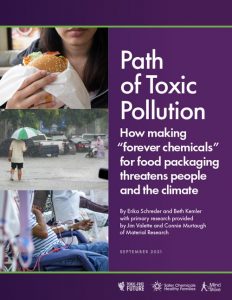Research Report
Recommendations
Path of Toxic Pollution, an Investigative Report
Recommendations
Restaurant and grocery chains and other food retailers
- Adopt and implement a public policy with clear quantifiable goals and timelines for reducing and eliminating PFAS in all food contact materials in restaurants and supply chains.
- Ensure substitutes are safer, at a minimum free of any GreenScreen Benchmark 1 chemicals and any organohalogen compounds.
- Provide safe reusable food serviceware and train staff to make this the default for customers.
- Publicly report on progress and announce when the food contact materials are PFAS-free.
- Develop a comprehensive safer chemicals policy to reduce and eliminate other toxic chemicals, such as ortho-phthalates, in food contact materials and other products.
Other parties also have a role to play
- Federal, state, and local governments should ban PFAS, as well as other substances made using organohalogens, in food contact materials; ensure safer alternatives; and leverage their institutional purchasing power to buy safer PFAS-free food serviceware.
- EPA should close the loophole that allows the dangerous climate pollutant HCFC-22 to be used as an intermediate in the manufacture of PFAS.
- Polluters like Daikin should pay for the cleanup of PFAS in communities that have been affected by manufacturing, use, and disposal.
- FDA should withdraw its approvals for all PFAS in food contact materials and not approve any new PFAS.
- Commercial composting facilities should accept only food packaging that is certified PFAS-free (i.e. certified by the Biodegradable Products Institute or the Compost Manufacturing Alliance).
- Individuals should call on food retailers and elected officials to ban PFAS in food contact materials.
Read the full report
In the Report
- I.Recommendations

